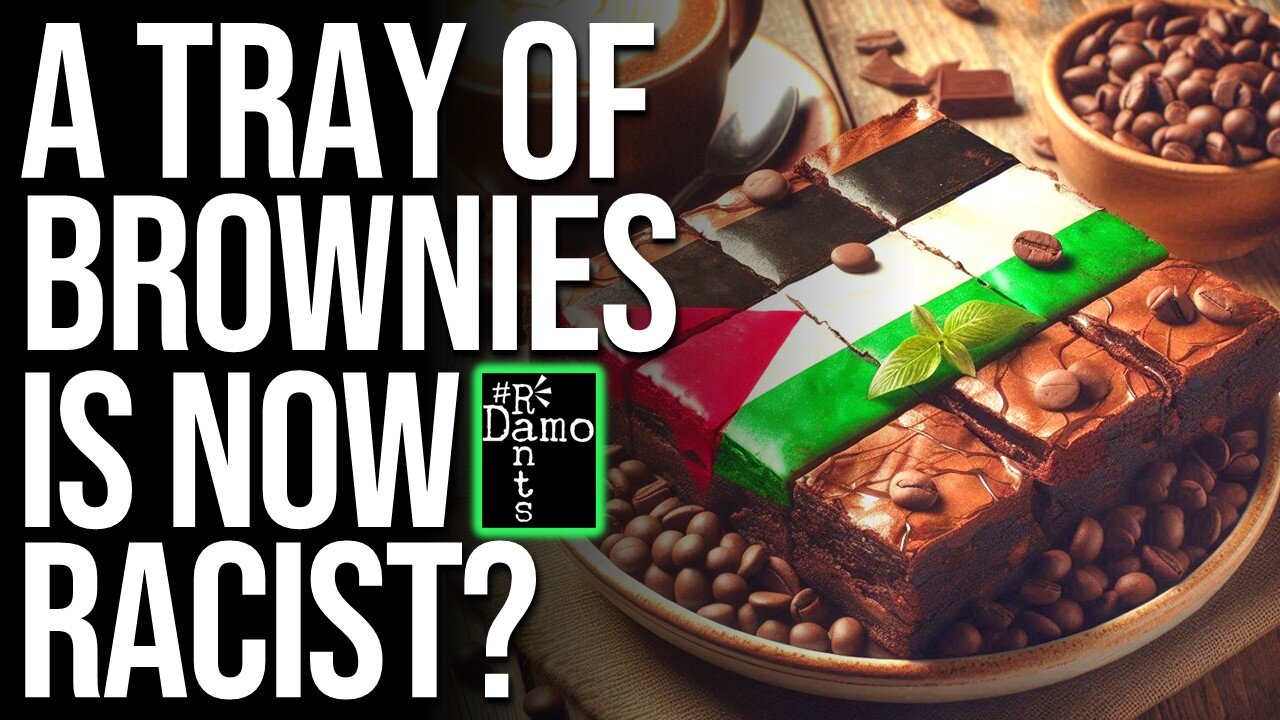Premium Only Content

The EU Thought This Was Helping Israel – It Really Hasn't!
Right, so there are wild stretches to defend Zionism, Israel and the actions of the Israeli state and so often this is done in the name of calling out anti Jewish hatred, antisemitism, conflating that with Zionism itself, but this is possibly the most insane example of this I’ve ever read. The European Union’s moral credibility has taken a spectacular dive into self-parody, as Katharina von Schnurbein, the EU’s Coordinator for Combating Antisemitism, warned diplomats that bake sales raising money for Gaza could constitute “ambient antisemitism.” Cake is now racist if you bake it in the name of raising money for Gaza in other words.
This was not a clumsy slip of the tongue. It is absolutely insance, but it is also the logical outcome of a political culture where criticism of Israel—even gestures of solidarity with its victims—is routinely smeared as antisemitic and functionally they must now be running out of things to weaponise surely? Von Schnurbein’s remark perfectly encapsulates the now deranged absurdity of a system shaped by decades of Zionist lobbying, weaponised definitions, and political cowardice. And it comes at a time when Israel itself is planning what human rights lawyers call a concentration camp in Rafah. She’s more worried about antisemitic brownies! You baked rock cakes for Gaza? That’s emblematic of the chosen weapon of a Gazan child! Well given how mine turn out of occasion perhaps, but not generally!
This bats**t level of overreach does more than just make EU officials look ridiculous; it trivialises real antisemitism, erodes democratic credibility, it is a really low blow actually and perhaps we shouldn’t find it so funny, but is also rapidly and deservedly backfiring, isolating Israel and discrediting those ridiculous enough to claim that cake of all things, can now be a threat.
Right, so the first question to address is how we arrived at the absurd point where a humanitarian bake sale can be branded antisemitic. The answer lies in the ideological framework that now dominates European discourse on Israel: the International Holocaust Remembrance Alliance (IHRA) working definition of antisemitism. While the IHRA definition correctly identifies many forms of anti-Jewish hatred, its illustrative examples blur that line between antisemitism and political criticism of Israel. It conflates the two and for me, that is itself antisemitic. By including statements such as “claiming that the existence of the State of Israel is a racist endeavour,” the IHRA definition has effectively transformed criticism of Israel’s policies into a potential hate crime.
Von Schnurbein has been one of the key architects of this shift within the EU. Since her appointment in 2015, she has pushed aggressively for the IHRA definition to be adopted by EU institutions and member states. Her logic, expressed in interviews with JNS, is that antisemitism and anti-Zionism are basically inseparable, describing the distinction between the two as “artificial.” Such a position has turned EU antisemitism policy from a legitimate defence of Jewish communities into an ideological shield for the Israeli state.
This deliberate conflation explains how von Schnurbein could describe bake sales as antisemitic without blinking. In her worldview, even an apolitical humanitarian fundraiser is dangerous because it might symbolically “delegitimise Israel.” The absurdity of this position is obvious to ordinary people, but within the halls of Brussels, where careers can seemingly be destroyed by a single accusation of antisemitism, it has become institutional belief.
To understand the significance of von Schnurbein’s intervention, it is important to examine her track record. Far from being a neutral defender of Jewish safety, she has consistently acted as a political operator advancing pro-Israel narratives.
Her influence was most clearly demonstrated in the Tel Aviv lobbying scandal. According to an EUobserver report, von Schnurbein warned EU diplomats that sanctions against Israel could be based on “rumours about Jews, as opposed to facts” language that implicitly cast legitimate human rights concerns as potentially antisemitic when applied to Israel. This intervention reportedly helped stall discussions about punitive measures against Israel despite overwhelming evidence of war crimes in Gaza.
Von Schnurbein’s career has been shaped by such ideological positioning. She has worked to consolidate ties between EU institutions and pro-Israel advocacy groups, pushing policies that align with their priorities. For example, she has championed the protection of kosher slaughter and circumcision laws—not inherently problematic in themselves, but politically significant in cementing alliances with religious groups that are also vocal defenders of Israel. The Times of Israel described her as a “defender of kosher slaughter and circumcision,” but her interventions in these areas have also served a broader political strategy of aligning Jewish cultural rights with support for the Israeli state.
Perhaps most telling is her selective focus. While far-right antisemitism has surged in parts of Europe, von Schnurbein has devoted disproportionate attention to policing pro-Palestinian activism. This imbalance has not gone unnoticed. Critics argue that her office has become less about protecting Jewish communities and more about criminalising dissent against Israel.
Von Schnurbein’s bake sale comments are not an isolated example in their ridiculousness; they are part of a wider pattern of hysterical overreach by pro-Israel officials across Europe and the West. This pattern reflects a coordinated strategy of suppressing criticism of Israel by conflating it with antisemitism.
The destruction of Jeremy Corbyn’s career as Labour leader here in the UK is perhaps the most infamous case. Corbyn was accused of antisemitism after defending a mural that criticised capitalist elites. Though the mural did not explicitly reference Jews, pro-Israel lobbyists framed it as a coded antisemitic trope, and the mainstream media ran with it, amplified that narrative among many.
In Germany, Berlin’s education authorities banned students from wearing Palestinian keffiyehs, claiming the traditional scarf made Jewish classmates feel unsafe. This policy, as reported by Daily Sabah, turned a cultural symbol of resistance into a supposed hate emblem. Belgium went even further by briefly banning watermelons at public demonstrations, alleging they carried antisemitic connotations.
The UK’s Charity Commission has investigated organisations raising money for Gaza, accusing them of potentially funding terrorism. These investigations have had a chilling effect on humanitarian activism, echoing von Schnurbein’s “ambient antisemitism” narrative.
Even outside Europe, similar absurdities abound. In the United States, universities have disciplined students for holding vigils for Gaza victims, and lawmakers have compared the Boycott, Divestment and Sanctions (BDS) movement to Nazi boycotts of Jewish shops—an accusation so grotesque it shouldn’t even warrant the need for rebuttal.
These incidents are not random. They are the product of a transnational lobbying effort to silence criticism of Israel by making it politically and socially toxic. The cumulative effect is to create a culture where officials and politicians compete to demonstrate their loyalty to Israel, even if it means making themselves look ridiculous.
The question remains: why are politicians and officials willing to humiliate themselves by making such absurd claims? The answer lies in a combination of fear, lobbying, and media manipulation.
The fate of Jeremy Corbyn is instructive. His downfall sent a chilling message to Western politicians: challenge Israel, and you will be destroyed. Ilhan Omar in the United States faced similar treatment, smeared as antisemitic for criticising AIPAC’s influence on Congress. In the UK, Zarah Sultana has faced relentless attacks simply for supporting Palestinian rights. These examples have created a political culture of fear in which officials like von Schnurbein overcompensate to avoid even the slightest accusation of antisemitism.
Lobbying networks exert enormous influence in Brussels, providing policy briefings, media talking points, and behind-the-scenes pressure on officials. Pro-Israel advocacy groups have mastered the art of narrative control, ensuring that their framing of events dominates mainstream media coverage. The result is a self-reinforcing cycle: politicians fear negative headlines, so they adopt extreme positions, which are then reported uncritically, further entrenching the narrative.
Whether von Schnurbein genuinely believes her own rhetoric is an open question. Some officials undoubtedly internalise these narratives, while others act out of pure careerist calculation. Either way, the result is the same: a political discourse in which reason and proportionality are abandoned in favour of ideological policing.
The absurdity of von Schnurbein’s comments becomes even starker when placed against the reality in Gaza. Israel is not merely conducting a military campaign; it is pursuing policies that meet the legal criteria for crimes against humanity. The so-called “humanitarian city” planned for Rafah is, in effect, a concentration camp: a fenced, tightly controlled zone where displaced Palestinians would be confined under total Israeli control.
Under international law, particularly the Nuremberg Principles, such forced internment constitutes a crime against humanity. The parallels with historical precedents are obvious. Like the bantustans of apartheid South Africa, the Rafah plan is designed to segregate and control a population stripped of its political rights. Like the ghettos of Nazi-occupied Europe, it imposes collective punishment and total dependence on an occupying power.
By attempting to suppress such comparisons, officials like von Schnurbein are engaging in historical revisionism. They invoke Holocaust memory to justify Israel’s actions while ignoring the fact that those actions increasingly resemble the very crimes the Holocaust was supposed to prevent. This is not only intellectually dishonest but morally bankrupt.
The overreach exemplified by von Schnurbein’s comments is beginning to backfire though, because antisemitic cake is something even some backing Israel don’t want a bar of being associated with, its so obviously unbelievable. Public trust in anti-hate institutions is eroding as ordinary citizens mock the absurdity of branding cakes and keffiyehs as antisemitic. Social media has amplified this backlash, turning pro-Israel talking points into memes and viral ridicule and von Schnurbein has only aided in that with her extremely stupid statement.
Movements like BDS are gaining momentum, fuelled by disgust at the blatant hypocrisy of Western officials. Opinion polls show declining support for Israel across Europe.
More importantly, this overreach undermines the fight against real antisemitism. When people hear that a bake sale is antisemitic, they are less likely to take genuine threats to Jewish communities seriously. This trivialisation harms the very people it is supposedly designed to protect and so Von Schnurbein has made a mockery of her own remit, exposing the fact that shielding Israel is more important that protecting Jews. Surely therefore, her position is now untenable?
Katharina von Schnurbein’s “cake is antisemitic” comment is more than just a political gaffe. It symbolises the collapse of Western credibility on human rights. By defending Israel’s genocidal policies with arguments so ridiculous they sound like satire, EU officials have transformed themselves into global punchlines.
Yet the stakes are deadly serious. This absurdity legitimises war crimes, silences dissent, and erodes trust in democratic institutions. Zionist lobbying, once a formidable political force, Lord knows Israel sink enough money into it, is now undermining itself through its own excesses. When defending genocide sounds like a comedy sketch, you do not win allies—you drive them away.
The EU’s reputation as a moral authority has again been damaged from within here: a union trading its principles for political expediency and defending criticism of concentration camps by condemning cake instead. It’s not a good look, but they’re the optics right now.
Speaking of said concentration camp though, although no definite confirmation of this has yet come through, Israel may not be able to afford to build it, costs soaring into the billions of dollars and dissent from within as the head of the IDF for one, has said he’s not keen on the idea. Given Jewish history, no Jew should frankly, but Zionists like Benjamin Netanyahu and Israel Katz are built slightly differently. Get all the details of that story in this video recommendation here as your suggested next watch.
Please do also hit like, share and subscribe if you haven’t done so already so as to ensure you don’t miss out on all new daily content as well as spreading the word and helping to support the channel at the same time which is very much appreciated, holding power to account for ordinary working class people and I will hopefully catch you on the next vid. Cheers folks.
-
 1:20:41
1:20:41
TRAGIKxGHOST
3 hours agoTrying to get SCARED tonight! | Are You SCARED!? | Screams Beyond Midnight | Grab a Snack
11.5K2 -
 LIVE
LIVE
StuffCentral
5 hours agoI'm baaack (no you can't play with me.. unless you a healer)
195 watching -
 2:25:11
2:25:11
TheSaltyCracker
6 hours agoTrump Is Not Dead ReEEeStream 8-31-25
80.6K111 -
 3:09:16
3:09:16
THOUGHTCAST With Jeff D.
4 hours ago $1.12 earnedLabor Day Weekend FORTNITE With THOUGHTCAST Jeff & the squad
17.5K4 -
 3:44:05
3:44:05
Rallied
7 hours ago $4.38 earnedSolo Challenges All Day
44.3K1 -
 LIVE
LIVE
iCheapshot
7 hours ago $0.28 earnedCall of Duty: Black Ops Campaign
48 watching -
 4:39:16
4:39:16
Meisters of Madness
8 hours agoMadness in a Pod
9.39K1 -
 1:25:44
1:25:44
HELMETFIRE
4 hours ago🟢GAMING WITH FIRE EP9🟢
9.36K -
 1:24:08
1:24:08
Jean-Claude@BeyondMystic
16 hours ago🌀 THE WACKY WOO SHOW 3I ATLAS ALIEN INVASION with DICK ALLGIRE & JC - AUG 31 , 20254
50.7K67 -
 2:26:21
2:26:21
vivafrei
15 hours agoEp. 279: Patel's GF Sues for Defamation! Rogue Judges vs. Trump! Raja Jackson, Kick Stream & MORE!
146K88